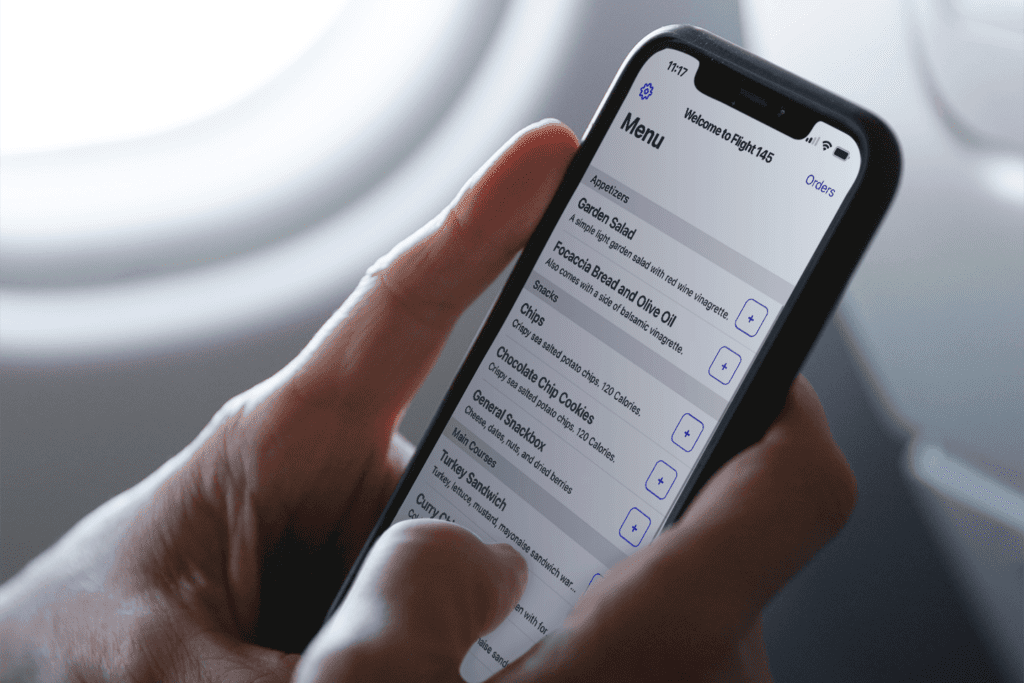
Japan Airlines is one of two carriers that has now trialed the use of a P2P mobile device software developed by Ditto. (Ditto)
Japan Airlines (JAL) has completed a pilot project testing the use of a real-time database that allows passenger mobile devices to synchronize data in real-time “even without internet connectivity,” according to Ditto, the California-based startup that provides the database.
The pilot involved JAL flight attendants and passengers trialing the use of Ditto’s software for in-flight meal ordering via mobile devices that the company emphasizes can be performed with no internet connectivity. JAL trialed the software on 12 flights involving more than 60 flight attendants using Apple iPads to trace passenger orders in real-time throughout the duration of each flight.
“Ditto offers a software development kit (SDK) that a developer embeds into an application, such as an airline’s passenger app, and then it automatically manages the Wi-Fi and Bluetooth radios to connect to other devices peer-to-peer,” Adam Fish, CEO and co-founder of Ditto, told Avionics International. This means airlines don’t need to install any hardware—Ditto can connect crew devices to other crew and to passengers using Bluetooth and [peer-to-peer] P2P Wi-Fi of the mobile devices onboard. The core technology of Ditto is our replicated database that automatically syncs over any available network.”
According to their website, the SDK that was provided to JAL is Ditto’s “Small Peer,” that comes equipped with an embedded database to ensure that the mobile devices that the SDK is running on will always be able to read and write data, using a series of communication techniques “Bluetooth Low Energy, P2P Wi-Fi and Local Area Network.”

Ditto provides this visual overview of its Big Peer cloud database that helps enable its real-time database for mobile device-to-device communications. (Ditto)
Separately, Ditto also manages a Big Peer, its cloud database, and a series of nodes that host HTTP APIs, webhooks, and other real-time synchronization mechanisms for enabling data sharing between devices.
“For in-flight ordering, Ditto offers pre-built software called SkyService which airlines can use directly or customize as building blocks. JAL’s trial used this. Alternatively, other airlines use SkyService just as a guide on how they can build the ordering into their own apps. SkyService contains a crew application which allows the crew to chat, coordinate tasks, manage the menu and inventory and process orders,” Fish said.

JAL flight attendants using Ditto’s software to track in-flight meal orders.
Etihad Airways has also trialed the use of Ditto’s cross-platform database. In an April 21 press release, the Middle Eastern carrier notes that their flight crew evaluated the use of Ditto to “communicate with each other in real-time in a socially distanced manner and also digitally record guests’ meal orders in Business Class, replacing the current paper-based ordering method.”
According to Etihad, “if successful,” they believe they could eventually replace printed menus and allow passengers to order in-flight meals directly on their mobile devices.
Disney Lo, assistant manager for JAL’s Information Technology Planning Department, told Avionics that the airline is enthusiastic about exploring new technologies “that allow us to do our jobs to the best of our ability.”

JAL flight attendants trialed the use of Ditto’s software on 60 flights. (JAL)
“We see the great potential of Ditto’s technology which helps us elevate our service to the next level by improving the communication quality in the cabin environment. Our crew members are excited to see a seamless working environment, providing better flight experience to our passengers. We are expecting to realize digital mobilization with this technology in the future,” Lo said.
First established in 2018, Fish said that Ditto’s software has also been used in quick-service restaurant point of sales systems, robotics, defense, and education applications.
Fish said that Ditto has other similar trials in the works that will eventually be launched with several European and U.S. airlines next year.